Have a good look at the photograph above. To me, it so perfectly captures what I think of as autumn. The variety of mellow colours in the fallen leaves, the gentle sunlight, the lengthening shadows. And yet the image has been carefully constructed, so as to give an impression of a natural scene that is more autumnal than anything you’ll find out there at the moment beneath the deciduous trees of the northern temperate regions. How do I know this? Because I created it.
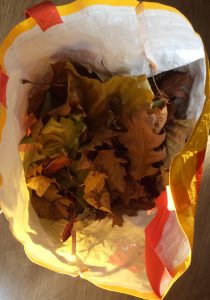 Earlier this week, on a murky afternoon I took my son for a walk. We went to the local park and as we walked around it I carefully gathered a variety of leaves, differing in shape, size, colour and texture. He helped, with increasing enthusiasm, and seemed most amused by trying to outdo my efforts by finding leaves that were even larger than the ones that I’d found. We carried the leaves back home and I spread them out to dry. I had an idea that I would photograph them later on, but my plans were no more specific than that.
Earlier this week, on a murky afternoon I took my son for a walk. We went to the local park and as we walked around it I carefully gathered a variety of leaves, differing in shape, size, colour and texture. He helped, with increasing enthusiasm, and seemed most amused by trying to outdo my efforts by finding leaves that were even larger than the ones that I’d found. We carried the leaves back home and I spread them out to dry. I had an idea that I would photograph them later on, but my plans were no more specific than that.
On a morning a few days later I noticed that the sunlight coming in through the windows at the back of the house was particularly mellow and ‘autumnal’ – and that seemed like the right opportunity to do something with the dried leaves that were, by now, jumbled and curling inside a large shopping bag. With the help of a tripod, for stability, I photographed individual leaves lying on the sunlit floor of my back room; I photographed individual leaves back-lit by the sunlight coming in through the patio doors; finally, I heaped all the leaves on a well-lit part of the floor and took several photographs of the pile, making minor adjustments to the arrangement between exposures.
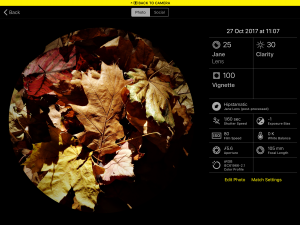 I immediately moved on to the final stage of the process – I reviewed the digital images on a larger screen, deleting some, in fact many, but retaining the others that seemed to have most ‘potential’. And then I applied some post-processing to these images, partly to compensate for the limitations of the hardware-software combinations of the camera that made the final image differ from my subjective perception of the scene as it appeared to me directly, and partly to accentuate features, textures, colour and shadow so that they were more satisfying to my aesthetic sensibility.
I immediately moved on to the final stage of the process – I reviewed the digital images on a larger screen, deleting some, in fact many, but retaining the others that seemed to have most ‘potential’. And then I applied some post-processing to these images, partly to compensate for the limitations of the hardware-software combinations of the camera that made the final image differ from my subjective perception of the scene as it appeared to me directly, and partly to accentuate features, textures, colour and shadow so that they were more satisfying to my aesthetic sensibility.
So, this morning when I was running through Southampton Common – for those not familiar with the place, it is a large public space for recreation in the city, with many paths through areas of very mature deciduous woodland – several threads of thought coincided and I realised that this photographic image that I’d made, so autumnal that it almost hurts to look at it, was a representation of nothing that could actually be found ‘out there’ in my surroundings. If a friend asked me to take them and show them where this autumnal scene lay so that they could behold it with their own eyes, I’d not be able to do this – not without reconstructing the leafy jumble on my back room floor. It would be really improbable to find the leaves from such a wide variety of tree species in one small location like this!
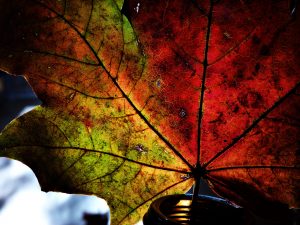 The creative process that led to the eventual appearance of this photograph on facebook / twitter / Instagram / flickr involved a sequence of deliberate choices, guided throughout by the idealised concept of “autumn” that I held in mind. I had chosen to go out at a particular time in the season. I selected certain leaves to make sure that I had a range of sizes, species and a progression of colours. I chose to dry the leaves (although this was partly down to convenience – I didn’t have the time to take any photographs while the leaves were still wet). I chose to photograph the leaves indoors, mainly so the wind didn’t blow them around, under very particular ‘natural’ lighting conditions. And finally, I rejected the images from the camera card that didn’t appeal to me, and digitally processed the surviving photos so that they looked the way I wanted them to.
The creative process that led to the eventual appearance of this photograph on facebook / twitter / Instagram / flickr involved a sequence of deliberate choices, guided throughout by the idealised concept of “autumn” that I held in mind. I had chosen to go out at a particular time in the season. I selected certain leaves to make sure that I had a range of sizes, species and a progression of colours. I chose to dry the leaves (although this was partly down to convenience – I didn’t have the time to take any photographs while the leaves were still wet). I chose to photograph the leaves indoors, mainly so the wind didn’t blow them around, under very particular ‘natural’ lighting conditions. And finally, I rejected the images from the camera card that didn’t appeal to me, and digitally processed the surviving photos so that they looked the way I wanted them to.
My point, I think, is that this kind of practical engagement with practising a creative art such as photography reveals a lot about what I find meaningful about the idealised concept of ‘autumn’ that I’ve created for myself. Before I’d even started this mini-project I already had an idea of what this autumnal image would look like, and the steps along the way involved continual refinement, calculated manipulation of my surroundings in order to incrementally bring my creation closer to the ideal concept that I held.
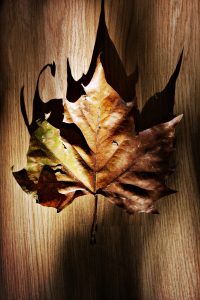 In this way, the left-brain mode of awareness, of conceptualising the world as being full of tools to be manipulated in order to produce specific outcomes, is an important part of the creative/artistic process. Dumbed-down pop psychology references to “right-brain people” being the expressive, creative, artistic ones are just that – a grossly over-simplified model. The process involves an integration of the modes of both brain hemispheres, and artistic maturity is likely to depend on the ineffable openness to experience that the right-mode provides in order to challenge the left-mode certainties that can trap us in fixed ways of seeing and thinking about our view of the world.
In this way, the left-brain mode of awareness, of conceptualising the world as being full of tools to be manipulated in order to produce specific outcomes, is an important part of the creative/artistic process. Dumbed-down pop psychology references to “right-brain people” being the expressive, creative, artistic ones are just that – a grossly over-simplified model. The process involves an integration of the modes of both brain hemispheres, and artistic maturity is likely to depend on the ineffable openness to experience that the right-mode provides in order to challenge the left-mode certainties that can trap us in fixed ways of seeing and thinking about our view of the world.
I think I’m recommending a kind of balance here, between the different hemispheric modes. Don’t be discouraged from taking part in creative and artistic practices because you don’t “have it in you”; if this sounds like you then you might make progress by understanding that creative processes require a combination of both right- and left-modes of thinking rather than it being the preserve of one brain hemisphere alone. On the other hand, if you do enthusiastically take part in creative and artistic practices, don’t repress the idea that the left-brain mode of thinking is an essential part of it all. Although it is possible to allow the reasoning, analytic side of awareness to over-dominate and perhaps derail your creative projects by bringing about too much rigidity or obsession with technical purity, but if a healthy balance is achieved then getting stuck can be avoided and new meaning and enjoyment can arise.
To conclude, I’m going to mention a different aspect of my concept of ‘autumn’, one that I have no idea yet how to express artistically. About a year ago, I was running on one of the narrow tarmac paths on Southampton Common and as I bounced along there was a continual skittering, swooshing sound following me down the path. It was the scraping of dry leaves on the tarmac, caught in the disturbed air that I left in my wake. For a few moments, before I over-thought it, I had a sense of being one moving part of the world, gently stirring other parts of the world which then danced around me. Anyway, words don’t really do justice to that subjective experience I had, so I’ll pop it on the creative back-burner and see what happens.

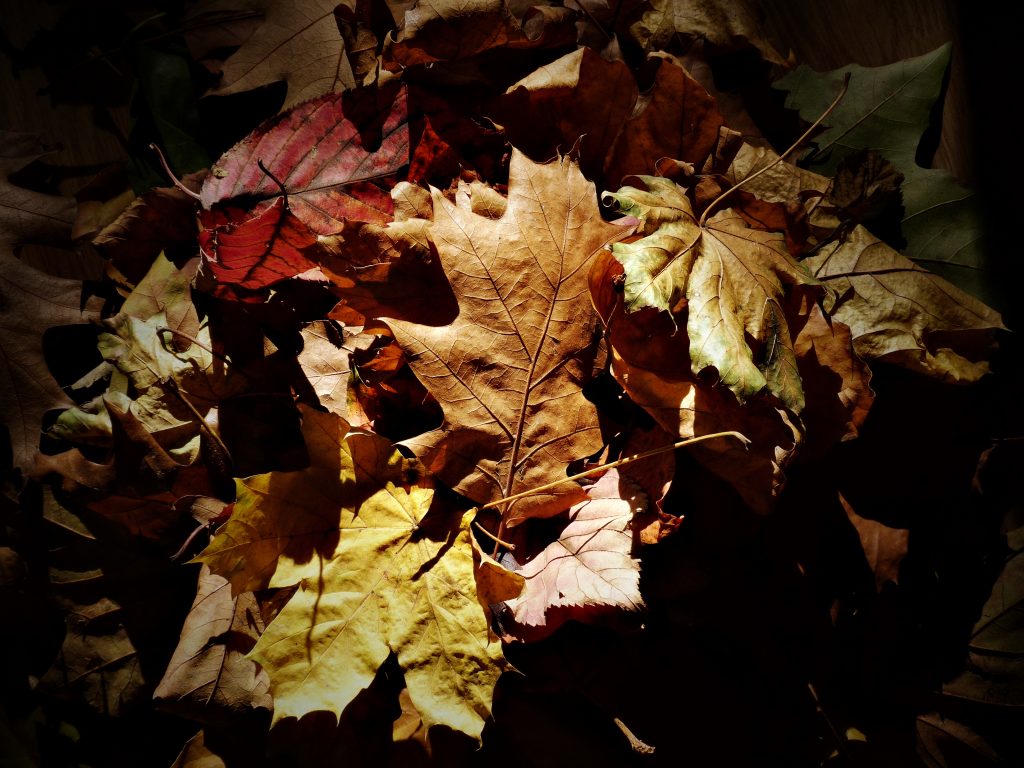
I’ll add this as an afterthought, rather than editing the article above… I think an insight that I’ve just had is that my autumn leaf photograph is analogous to a fictitious novel. I may have assembled the parts and so on, as described above, to re-create a feeling of autumn that I wouldn’t necessarily have found by going out into a park and looking for a pile of leaves to photograph. I think there is a nagging thought of ‘but it isn’t an authentic photograph’… but surely this need not bother me – I wouldn’t be worried about the ‘authenticity’ of a work of fiction, unless it was being falsely presented as a work of non-fiction. The distinction between fiction/non-fiction in photography is a very nebulous one, far from the (understandable, but often mis-used) ‘the camera never lies’ adage.